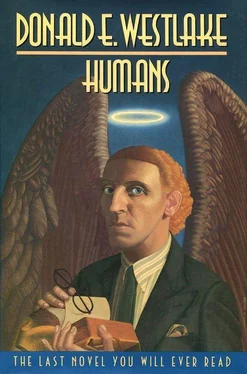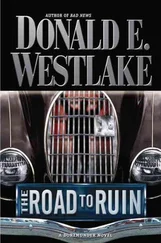Susan laughed, surprised to be laughing, and said, “Is that one of your jokes for whatsisname?”
“Beg pardon?”
“Oh, I’m sorry,” she said, and as she gave him a rough definition of “whatsisname,” economist Mikhail gently turned Jack Fielding away, saying, “Now, about this free market of yours. Surely, with Japan breathing down your necks, you don’t advocate a return to full laissez-faire.” (Simultaneously, the other Mikhail said toward Fielding, “I got to talk wid you about dis embassy of yours. We still got some problems to work out.”)
“Well, you know, we all have to adapt to changing reality,” said Fielding, obediently moving off in Mikhail’s wake, leaving Susan and Grigor alone, Grigor now trying to explain why the stage name Boris Boris was itself comic to a Russian audience, an explanation that turned out not to be at all easy, nor entirely satisfactory for either of them. Still, the conversation was under way, and Susan next described how she happened to be in Moscow as the result of winning an American vodka company’s contest, an explanation that also proved to be rather difficult, and less than satisfactory.
They’d been talking for quite a while, mostly about the sights of Moscow and the nearby countryside, when Grigor became aware that the crowd had thinned somewhat, and, startled, looked at his watch. Almost ten minutes past eight. “Oh, no,” he said, “I am late for my pill. Would you, please, hold my drink? Thank you.”
She stood holding both near-empty glasses as he took a small cardboard matchbox from his suitcoat pocket and removed from it a large green capsule. Smiling, shrugging his shoulders, he said, “I have never taken this with vodka before. Perhaps it will work better.” And he took back his glass and drained it, with the pill.
“Do you have the flu?” Susan asked. Then, because his English seemed so spotty, with sudden surprising lapses, she amplified, saying, “Some kind of cold or something?”
“No, nothing like that,” he told her. “I am not at all contagious.” Looking over at the bar, he said, “Have they stopped serving drinks?”
“I’m afraid so.” Then Susan took the plunge: “I’m supposed to have dinner in the hotel with a group of people, American tourists and a couple of Intourist guides and a Russian man from some sort of trade commission. Why not come with us? I’m sure it would be all right.”
Grigor thought: An adventure! Perhaps my last. “I accept with happiness,” he said.
It was over dessert, and the dessert wine, that Grigor finally told Susan the truth about his medical condition, and its causes.
“Chernobyl?”
“Yes.”
He was by then so full of vodka and wine and good food and good feelings that he wasn’t even self-conscious, not about his slippery English and not about his illness and not about his being a country bumpkin from Kiev and not about anything. He just told her, to tell someone.
All around them, up and down the long table, other desultory conversations continued, but Grigor ignored them all, because it felt so good at last to tell someone, just say the words to someone, someone away from the clinic. Yes, and to have it be someone who would then take the knowledge and go halfway around the world with it, totally away and gone, permitting Grigor to go quietly and peaceably back to his normal round. His normal spiral.
Susan was shocked. “Cancer? Radiation disease? Well, what is it? And there’s no hope at all? Grigor, listen! I have this cousin, I don’t know, third cousin, fourth cousin, I hardly ever see him, once or twice a year, well, that isn’t the point” — because she’d been drinking, too, and the hour was late — “the point is, he’s a doctor, he’s in research, he’s very important in AIDS research at NYU, I’m going to call him—”
“Too fast,” Grigor mumbled, eyes blurry, hand waving ineffectually, trying to slow down the flood of words. “Too fast, too fast. Do not understand,” he said.
“My cousin,” she said, slowly and clearly, “might know something, might be able to help. I will phone him. Could you go to New York, if it might help? Do you have enough money? Could you borrow it? Would they let you go away?”
He laughed, self-mockingly. “Oh, I have money,” he said. “And the doctors would let me go, if a good thing could come of it. But there is no good thing, Susan. Not for me. The switch is down. It is already down.”
“Well, you don’t have to give up ,” she told him, reminding him of the positive news announcers on CNN, “you certainly shouldn’t give up . I’ll call my cousin. Before he was on this AIDS research he was—” She broke off, frowned, leaned closer over the table toward him, gazing into his eyes as she said, “Grigor, do they have AIDS in Russia?”
“Oh, yes,” he said, nodding solemnly. “A very great problem, you know, in the hospitals.”
“Hospitals?”
“The needles. We do not have enough needles in Soviet,” he explained. “So they get used, what do you say, many times.”
“Over and over.”
“Yes, over and over. Many mothers and babies are... oh... infected. Over and over.” His eyes looked more deep-set and stricken than ever. “Many deaths,” he said. “Death all around us. Oh, Susan. Everything is dying, you know, Susan. Everything is dying.”
Vodka is no longer made anywhere from potatoes, I know that. I know whatever I need to know to complete His plan. But would Mikhail know it? Very well, but would Mikhail think that Susan knew it? Well, it doesn’t matter.
What matters is to recruit the actors — as in doers , those who will perform the necessary actions — and bring them together. And to do so with a certain degree of haste, which is why I had to hurry the Grigor-Susan meeting, appearing to each of them as the person appropriate to that moment for her, someone to be comfortable with, and for him, someone to believe. I would have brought them together in a way much more elegant, more subtle, if it weren’t that this task must be completed as rapidly as possible.
Rapidly. Why rapidly? I wondered that myself. When first I was shown His plan, when I had absorbed it, I expressed surprise at such hast. After all, when He had created this work, He’d spent millions of Earth years to do it, step by careful step, until every element was perfect. And when, during His most recent irritation with this corner of His universe, He had chosen to save the world rather than destroy it, He had taken, from conception to crucifixion, thirty-four of their years. So why such hurry now?
The reason, I was given to understand, was that He hadn’t been bored the other two times.
Kwan borrowed a bicycle from Tan Sun for his trip across the city to the neighborhood of the big hotels. She wheeled it out from the cool shady storage area under the house and handed it over to him, along with the chain to lock it up while he was with the reporter. Her expression was fretful and worried. “Be sure to look for police,” she said, “before you go into the hotel. You know what their unmarked cars look like.”
Kwan laughed, because he’d been through much worse than this , an interview with a reporter. “Everyone knows what their cars look like,” he said. “Clean, for one thing, and with no toys hanging from the inside mirror. And everyone knows what they look like, too. They all go to the same tailor, and he gives them the material the British won’t buy, the shiny grays and light blues. And then he cuts their jackets a little too short in the back.”
“Don’t act as though it’s a holiday,” she snapped, getting angry with him because she had no way to release her tension.
Читать дальше






